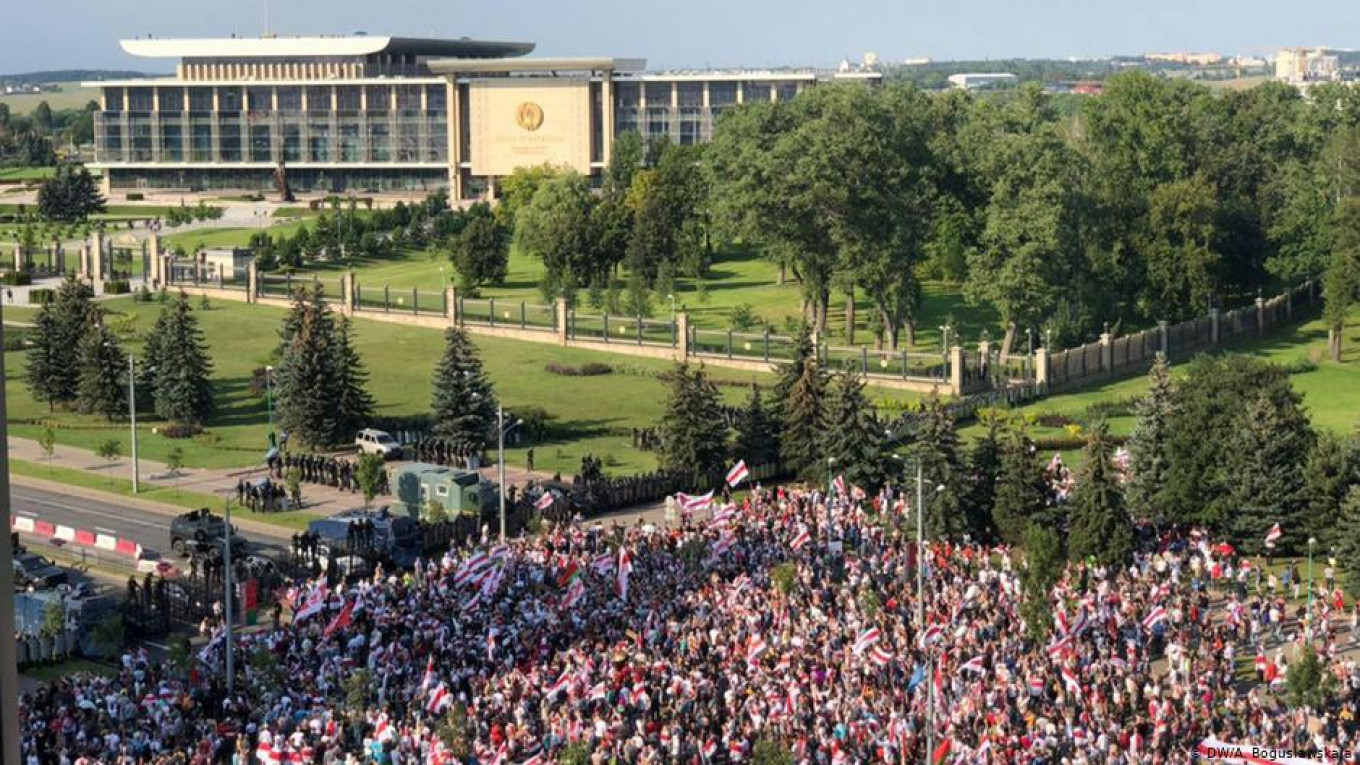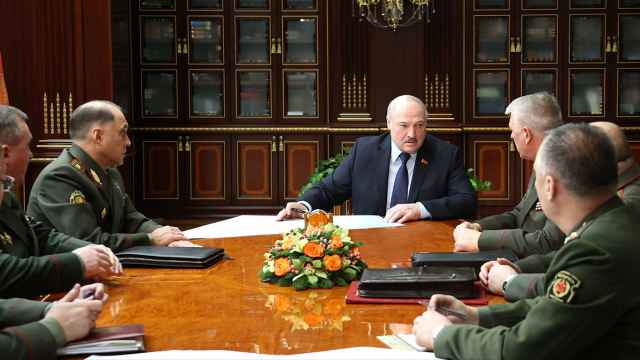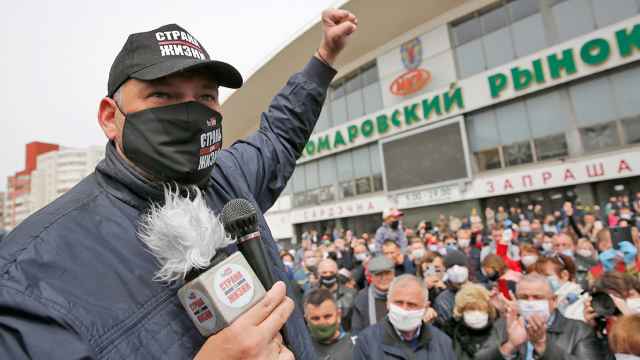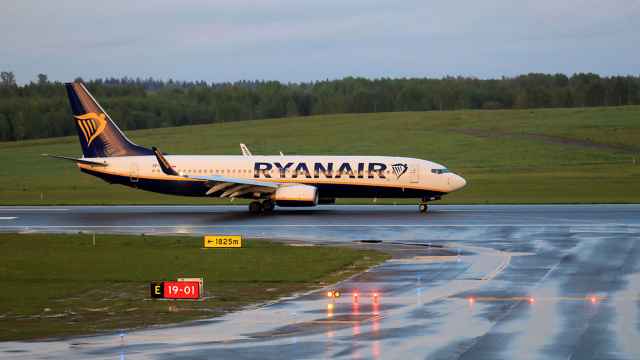Tens of thousands of opposition supporters marched through the Belarusian capital of Minsk on Sunday calling for an end to strongman Alexander Lukashenko's rule, despite heavily armed police and troops blocking streets and detaining dozens of demonstrators.
Protests have now entered a third week since the disputed presidential election on August 9 in which Lukashenko claimed victory, while opposition rival Svetlana Tikhanovskaya said she was the true winner.
An AFP journalist and local media estimated that more than 100,000 people came to Sunday's protest, equalling the scale of the rallies on previous weekends, the largest demonstrations the country has seen since independence from the U.S.S.R.
Some protesters gathered around Lukashenko's official residence in the center of Minsk, the Palace of Independence, which was guarded by a cordon of riot police and special forces with helmets and anti-riot shields, equipped with water cannons.
Sunday's rally fell on Lukashenko's 66th birthday and online opposition messages urged people to bring flowers and "creative" handmade gifts reflecting their attitude to the authoritarian leader.
Some chanted "Get out! We're coming for you on your birthday!"
Others held quirky items aloft including a cardboard model toilet with a sign urging Lukashenko to "flush" himself away. Others carried a model coffin with "Dictatorship" written on the side and a picture of a giant cockroach, the nickname used by the opposition for Lukashenko.
There were chants of "The rat is you and we're the people," reported local news site Nasha Niva, after Lukashenko referred to protesters as "rats."
Thousands also held similar rallies in other Belarusian cities, including Brest and Grodno, local media reported.
Protesters face off against riot police
The Minsk Peace March started at 2pm local time (1100 GMT) with police beginning to detain protesters minutes afterwards, as people headed for the central Independence Square.
Columns of protesters walked through the centre, carrying placards and the country's historic red-and-white flag, many with children in tow, as cars honked horns in support.
Some linked arms to march along the middle of a main street and attempted to remonstrate with black-clad riot police.
The Belarusian interior ministry said police detained 125 in the first two hours, Interfax-Zapad news agency reported. They faced a charge of taking part in illegal mass protests.
Protesters faced off against interior troops and riot police, kitted out in helmets and bullet-proof vests and armed with guns and batons, who used anti-riot shields to block people's passage.
Local media posted video of military vehicles driving towards the Independence Square
Protesters in groups moved in various directions around the city, attempting to bypass police blocks.
Machine-gun-toting troops wearing balaclavas and without identifying badges took up positions around a war memorial that has been a rallying point for the protests.
Marchers began moving there and some stood on the grass nearby. The atmosphere remained relaxed and festive, with a violinist playing a protest song and people dancing to rave music.
Morally bankrupt
The latest rally came amid a harsh crackdown on media freedoms.
On Saturday the Belarusian foreign ministry withdrew accreditation for numerous journalists working for international media, including AFP, the BBC and Radio Liberty / Radio Free Europe, with a government official citing "counter-terrorism" grounds.
The move was condemned by Germany and the United States. Tikhanovskaya, who has fled to the safety of Lithuania, on Saturday said that this step was "another sign that this regime is morally bankrupt" and resorting to "fear and intimidation."
European leaders have urged Lukashenko to launch dialogue with the opposition and Tikhanovskaya's supporters have set up a Coordination Council to organize a peaceful transfer of power.
The Belarusian authorities have detained several members and hauled in others for questioning, including Nobel Literature Prize-winner Svetlana Alexievich.
Lukashenko spoke to Russian President Vladimir Putin shortly before the protest began with the Kremlin leader wishing him a happy birthday.
The Kremlin said they agreed to meet in Moscow "in the next weeks" and on their intentions to further strengthen Belarus-Russia's alliance," after Putin this week vowed military support for Lukashenko if needed.
Putin said Russia had prepared a reserve of law enforcement officers to deploy if the situation got "out of control."
Reporters covering the protests have been detained and police have confiscated memory cards from photographers' cameras.
The authorities have also shut off Internet access repeatedly, making it harder for independent media to report from the scene.
On Sunday, more than 360 Belarusian sports figures including several Olympic athletes signed an open letter calling for new elections to be held according to international standards and condemning police violence.
Lukashenko ordered brutal police tactics following the elections that led to the death of three men while hundreds were wounded. More than 7,000 people were detained.
A Message from The Moscow Times:
Dear readers,
We are facing unprecedented challenges. Russia's Prosecutor General's Office has designated The Moscow Times as an "undesirable" organization, criminalizing our work and putting our staff at risk of prosecution. This follows our earlier unjust labeling as a "foreign agent."
These actions are direct attempts to silence independent journalism in Russia. The authorities claim our work "discredits the decisions of the Russian leadership." We see things differently: we strive to provide accurate, unbiased reporting on Russia.
We, the journalists of The Moscow Times, refuse to be silenced. But to continue our work, we need your help.
Your support, no matter how small, makes a world of difference. If you can, please support us monthly starting from just $2. It's quick to set up, and every contribution makes a significant impact.
By supporting The Moscow Times, you're defending open, independent journalism in the face of repression. Thank you for standing with us.
Remind me later.






